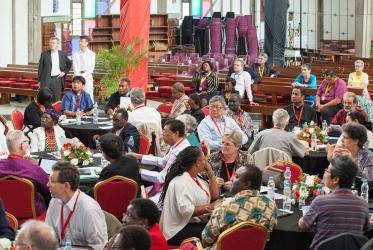Displaying 41 - 60 of 96
Zambia statement expresses concern over lack of peace
11 January 2018
WCC Executive Committee issues statement on bishop from Philippines
18 November 2017
In Zambia, foreign investors complicate “economy of life”
06 September 2017
GEM School: integrating theology and economics
05 September 2017
“Overcoming economic injustice” vision of WCC’s Athena Peralta
23 February 2017
Zambia: “On HIV, we do not compete. We work together.”
20 October 2016
New videos help congregations hasten HIV response
20 October 2016
Kenya: Voice of faith communities crucial in overcoming HIV
14 October 2016
New Executive Committee members elected in Trondheim
28 June 2016











